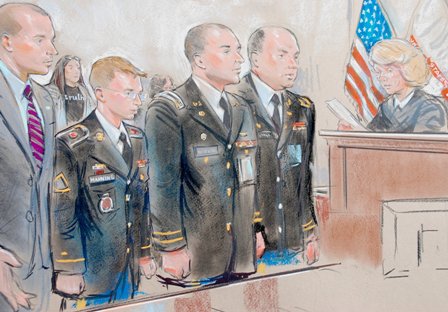 FT. MEADE, Maryland (CNN) -- The officer who oversaw security at the military base where Bradley Manning was held for a time said on Wednesday he was not pressured by superiors to keep the Army private accused of leaking classified documents to the WikiLeaks website in a high-level lockup and under constant watch.
FT. MEADE, Maryland (CNN) -- The officer who oversaw security at the military base where Bradley Manning was held for a time said on Wednesday he was not pressured by superiors to keep the Army private accused of leaking classified documents to the WikiLeaks website in a high-level lockup and under constant watch.
Marine Col. Robert Oltman said his decision to maintain maximum-security status for Manning during his eight-month confinement in Quantico in Virginia was borne out of caution.
Oltman said at a pre-trial hearing at Fort Meade, Maryland, for Manning that he recognized the case was high profile but told subordinates at the Marine base to "do what's right" and not "worry about somebody looking over your shoulder."
Manning's lawyers are trying to get the case thrown out -- or at least any sentence reduced, if he's convicted -- by claiming he was mistreated at the Quantico brig from July 2010 until he was moved to the military prison at Ft. Leavenworth, Kansas, in April 2011.
A Navy psychiatrist testified that his regular recommendations to ease Manning's heightened confinement status after being taken off formal suicide watch within weeks of his arrival in Virginia from the Middle East were not acted upon by commanders.
"The degree of concern of his safety and security was higher than anything I'd previously seen," said Capt. William Hoctor, who has more than 20 years of experience in military and civilian corrections.
Several times during the hearing, there was testimony about Manning being forced to stand outside his cell naked during morning roll call.
Oltman testified that nudity was Manning's choice and that he had two blankets for covering up if he wanted to use them. Coombs alleged that Manning was told to drop the blankets.
A spokesman for Manning said previously that he also was prevented from exercising and had to respond every five minutes - around the clock - to loud verbal queries to ensure he was not trying to commit suicide.
Coombs tried to show that Oltman was pressured by a superior to keep Manning under maximum security status and under special watch due to intense publicity.
Oltman said he knew Manning's case had the attention of his superiors -- "it was on the news, it was on CNN" -- but he denied there was any pressure. Oltman said he erred on the side of caution in Manning's case because another detainee had killed himself while in custody prior to Manning's arrival.
Hoctor, who saw Manning for most of his time at the Quantico brig, testified that he believed Manning was a potential suicide risk when he arrived. That assessment was based on medical records from a psychiatrist who examined him in Kuwait.
Hoctor said he and the brig staff exercised a heightened state of vigilance regarding Mannning's behavior. But he recommended that Manning be taken off suicide watch after a week. Manning was upgraded a few weeks later to a status known as prevention of injury watch.
Hoctor then recommended a short time after that that Manning be removed from the second designation.
"He had been observed for about a week or two without exhibiting any evidence of being suicidal. We were satisfied he no longer represented a risk," Hoctor said.
But Manning's status was never again changed at Quantico, despite regular recommendations from Hoctor that commanders do so.
Manning was a good detainee in general, he said.
"He was pretty well behaved," Hoctor testified. "He actually held up better than expected."
Hoctor said that notes of Manning's medical care while at Quantico were hand-written because he was not allowed access to a computer and those notes have been missing since Manning was moved to Ft. Leavenworth.
Manning, 24, is expected to take the stand later this week to testify about his detention.
The Army intelligence analyst is accused of leaking classified military and State Department documents while serving in Iraq. Many of them wound up on the WikiLeaks website. WikiLeaks has never confirmed that Manning was the source of the information.
Counts against Manning include aiding the enemy, wrongfully causing intelligence to be published on the Internet, transmitting national defense information and theft of public property or records.
He could receive a sentence of up to life, if convicted on all counts at his court martial.
™ & © 2012 Cable News Network, Inc., a Time Warner Company. All rights reserved.
- Home
- News
- Opinion
- Entertainment
- Classified
- About Us
 MLK Breakfast
MLK Breakfast- Community
- Foundation
- Obituaries
- Donate
04-20-2024 2:46 am • PDX and SEA Weather






















































































































































































































































































































